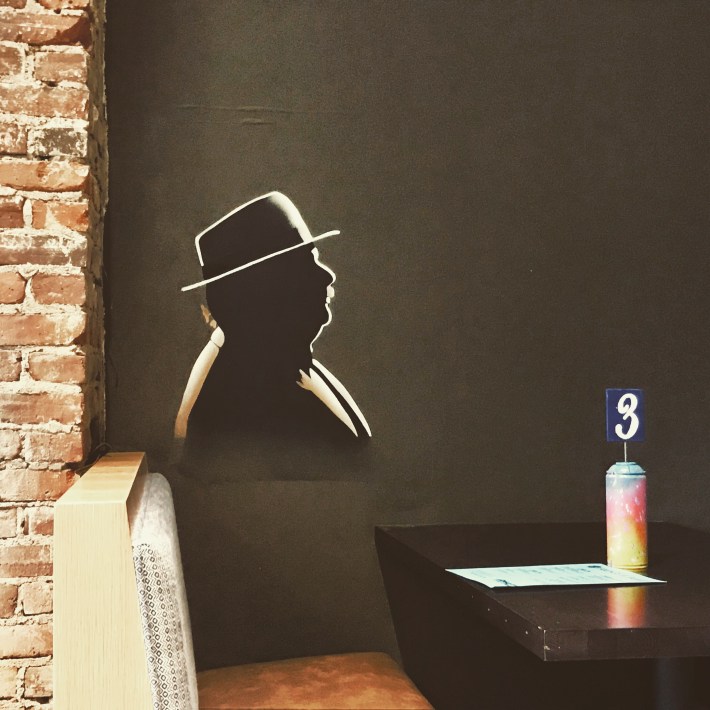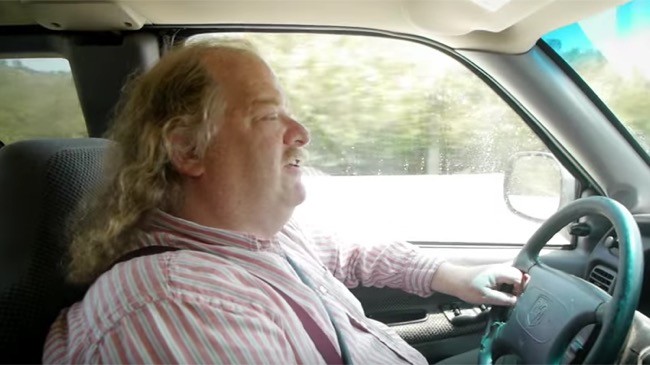[dropcap size=big]T[/dropcap]here is a moment in the documentary City of Gold where Jonathan Gold pretty much sums up Los Angeles car culture in one perfect phrase: “I’m an L.A. guy. I drive. I am my truck. My truck is me.”
Saturday, L.A. City Hall and the old L.A. Times building will light up in gold to honor the quintessential L.A. guy on what would have been his 58th birthday.
The L.A. native was an an unwavering champion of Los Angeles and Southern California culture. Here are seven other perfect Jonathan Gold quotes about El Pueblo de Nuestra Señora la Reina de los Ángeles de Porciúncula.
“It is the coldest night of the year, the winds have started to blow, and I am driving along Olympic Boulevard in East Los Angeles, ravenously hungry, looking for one of the itinerant flame-throwing taco carts that sprout in that neighborhood around midnight. You also may belong to L.A.'s great brotherhood of taco eaters, huddled around trucks late at night, balancing three ounces of highly spiced meat and drawing furtively from an icy bottle of imported Mexican Coke.
There's something about the smell of charring meat, the fire, the island of warmth and light in the cold dark, that can practically compel you to stand around, to eat off soggy paper plates balanced on the roof of your car, to inhale varieties of sweet, dilute fruit juice that you ordinarily wouldn't drink on a bet, to watch the cone of marinated pork blackening on its flame-licked spit as if it were the final minutes of the World Cup. You munch still-muddy radishes to sweeten your breath, but the stink of onions and garlic and cilantro and pig flesh will haunt you like a friendly ghost for days.”
“Los Angeles is a young city, but it has always had its own cuisine, based on the quality of its produce, the ease of its style, the pleasantness of being able to barbecue outside in your shirtsleeves almost every day of the year.
The vaqueros ate like that in California’s early days, and so did the Midwesterners when they settled here at the beginning of the last century. The Sunset magazine, men-grilling paradigm of the 1950s was a continuation of the aesthetic. When it is 72 degrees outside and the surf is up and Vin Scully is on the radio, who has the patience for casseroles or stews?”
"What Apache's serves reflects neither Mexico City street food nor the revered carne asada traditions of northern Mexico, but 10,000 barbecues in Eastside parks and backyards, the ones where the meat is always carne, the drinks are always cold, and somebody's Uncle Rudy is always manning the grill."
“In one mall, newscasters have been lining up for standups against scenes of picturesque devastation the way that 747s sometimes circle over O'Hare.
And yet the neighborhood survives, mango vendors and paleta carts flourishing in the morning-after calm like the cheerful green shoots that sprout from a newly charred forest floor, noodle shops and dumpling houses, doughnut stands and taquerias that swept away the broken glass and were running again the morning after the troubled afternoon. A lone, well-lighted Salvadoran restaurant in a blocklong burned-out mall stands improbable sentinel, churning out pupusas and carne asada although surrounded on either side by ruined stores, smoking rubble and military patrols.”

“Heraclitus once wrote that it is impossible to step in the same river twice. In Los Angeles, it can be nearly impossible to eat in the same restaurant twice. This is, I believe, what the economists call creative destruction. And it is not impossible here to experience extremes — restaurants that are born and die in a single evening; restaurants in suburbs so distant that they may as well be theoretical; restaurants so hard to get into that they may not actually exist outside of blogs.
Los Angeles is where the modern restaurant was born, the good, the bad and the ugly of it, and we're too far gone to stop now.”
“Pico, in a certain sense, was where I learned to eat. I also saw my first punk-rock show on Pico, was shot at, fell in love, bowled a 164, witnessed a knife fight, took cello lessons, raised chickens, ate Oki Dogs and heard X, Ice Cube, Hole and Willie Dixon perform (though not together) on Pico.”
“When the new owners closed escrow and inspected my apartment for the first time, they took off their shoes out of respect although I begged them not to, and they managed to restrain from grimacing as they slid their stockinged feet across the freshly mopped kitchen floor. When I went to a Wilshire high-rise to sign the new lease, one wall of their agent’s conference room was covered with a large-scale map of the Mid-Wilshire area on which each Korean-owned property was marked with a pushpin.
Entire swaths of the city, including much of Hancock Park, Country Club Park, the Ambassador district and the Pico-Union area, were paved with the pins, solid, shiny surfaces pebbled like the skin of a basketball — neighborhoods where the fire escapes now were blanketed with cabbage leaves in the fall, clotheslines (like mine) bristled with drying fish, the silence of dawn punctuated with the steady, rhythmic pounding of garlic in wooden mortars. I came to love that sound. In a way that I neither had been nor could be, my Korean neighbors were at home.”
RELATED:
A Cold Email From a Food-Obsessed Teen: Why I Owe Everything to Jonathan Gold
'Taco Should Be A Verb' ~ Five Essential Jonathan Gold Quotes About Tacos







